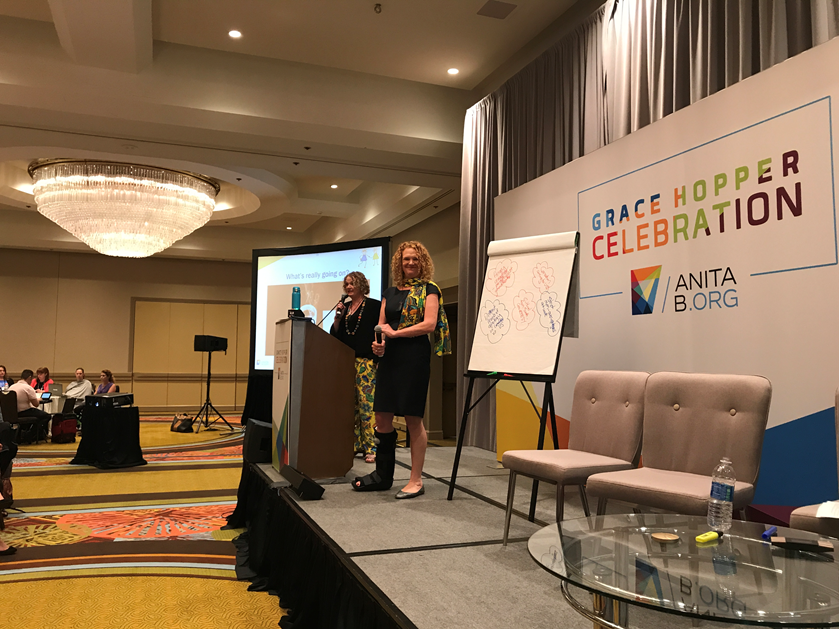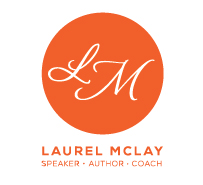(Firstly, thanks to those of you who responded to my last blog about wasbands and werewives. I refer later in this blog how viral this went; it even ended up in the South China Morning Post!)
I have just returned from presenting to various Women in Tech groups in the United States with my twin sister Josie, under our new brand Twinovate (I am the one behind the podium in the photo!). We were lucky enough to present at Salesforce, Apple, Planet Lab and to host a workshop at the incredible Grace Hopper 2017 women in computing conference in Orlando, Florida. Our topic was 'quit apologising, justifying and over-explaining'. It was incredible seeing how much this resonated with the audiences with both an oversubscribed session and the subsequent feedback we received. Check out this article and video about us from SiliconANGLE to get an overview of what we were on about.
The key points focused on women in STEM (science, technology, engineering and maths) who second-guess themselves, use cautious language, and don’t confidently express themselves/contribute unapologetically. We call it the ‘apology epidemic’ and the insidious thing about it, is that in many instances, women are not even aware that they are doing it.
We provided some powerful strategies, eg how to realise how often you do it (check out our Facebook page for our apology bingo sheet and other diagnostics like the gmail Just Not Sorry plug-in) and how to deal with the individuals in their organisation who might not take too kindly to a new more assertive communication style.
But for me, that is all ‘symptom’ stuff, and if we really want to live a life full of confidence, self-expression and freedom then feeling accepted for who we are and being unapologetically OURSELVES is key to this…
…(of course I am not alone in this, most personal development frameworks have authenticity as a primary focus).
What was special for me, was observing how much the value of inclusion was embraced. 18,000 attendees at Grace Hopper, and so much discussion about diversity. It was okay to have these conversations! It was okay to share your concerns around ‘offending’ someone and not walking on egg shells when talking about so called sensitive topics. So much acceptance of everyone, regardless of size, age, gender preference, race and personality. There were even little ribbons you could pop on your name tag to reflect the pronoun you like when referring to yourself (I had never even heard of Ze and Hir before this conference, and if you haven’t yet yourself, I recommend you find out more!).
What truly struck me about this was how this affects individuals who have spent their life feeling like an outcast. Who because of society’s confusion, awkwardness and judgement around ‘different’ have never felt like they belong anywhere. Who have spent their whole lives hiding their ‘real selves’ because of fear (real or imagined) of ridicule. I know some who wouldn’t even dare attend a conference like this in the past.
Danielle Brown, Chief Diversity and Inclusion officer at Google was a host on this brilliant Harvard Ideacast earlier in the year, talking about the value of diversity.
She refers to diversity as accepting anything different about someone and about addressing the whole person. Inclusion is feeling accepted for that in a community.
Addressing the whole person and accepting anything different. It is something super important to me, because I have spent so much of my life trying to fit in.
As an identical twin, growing up in the conservative ‘80’s, I spent my life craving to feel accepted and not liking
- the way I looked (frizzy red hair, freckly and skinny, buck teeth, and there were two of us!)
- the way I sounded (sooooo loud, overwhelming and over excitable, constantly being told to ‘calm down’)
- the way I moved (completely uncoordinated, awkward, clumsy and walking with a strange bounce).
Isn’t this something that affects almost all of us? Aren’t we craving to belong and be accepted because of the negative messages we received (or told ourselves) as kids around the way we looked, sounded, moved or acted?
That’s why Diversity and Inclusion is such a phenomenal movement in the business world. Some people write it off as overkill, others can’t see past the race or male/female element but it is so much more than that.
For me it’s about that glorious feeling that we belong, that we are accepted and that we can ‘fit in’ and ‘stand out’ at the same time. It’s about freely living a life that works for us, and inspiring others to do the same.
Some individuals might say that they have absolutely no need to belong or feel accepted. Here is an interesting quote from Brene Brown’s latest book ‘Braving the Wilderness’;
“Don’t walk through the world looking for evidence that you don’t belong. Because you will always find it… our worth and our belonging are not negotiated with other people; we carry those inside of our hearts."
I do believe we have the answers in ourselves and don’t need to look outside of ourselves for approval. I do believe it’s ‘up to us’. But it usually takes time and investment to ‘do the work’ and get to this stage (and because we are humans, I don’t think anyone masters it 24 x 7). Doesn’t it make sense to expect the ‘outside world’ to do its bit and create more opportunities for people to feel like they belong?
The pieces of the puzzle are starting to fit together for me personally. Diversity and inclusion has everything to do with the apology epidemic and everything to do with unapologetic lifestyles and careers.
A vision that I created way back in 2006 when I was coaching with the amazing Sally Anderson was...
“Igniting passion and love in community, and trusting everyday life as the ultimate celebration”.
This still stands true all these years later. If every day, we feel part of a community, including a workplace, then life is simply better. But so is business! As Danielle Brown states ‘Diversity is good for business’. I think I will save that conversation for another blog, along with neurodiversity, which is super exciting! Check out BBC’s series Employable Me, for an extraordinary example of accepting someone else who thinks differently (and leveraging that difference in your business).
Back to the wasbands and werewives blog and the stir it created. Firstly Stuff wrote the article, supposedly for their ‘Homed’ section, but it ended up on the front page of their news site, complete with a picture. Then The NZ Herald requested an interview, as did The Daily Mail. I am on the am Show on Monday 13th November at 8:50am talking about it too. There are loads of comments on the articles, mostly positive and I have been inundated personally with wonderful feedback.
So why did it generate such interest? From what I can gather, by being super open about what our relationship is and what it’s not, it helped people feel a lot better about not living the ‘Hollywood romance’. Feeling like you belong, regardless of your relationship status is huge, and relationship forms are changing. Check out this blog about the traditional arrangements being challenged.
I am presently facilitating “Unapologetic Women in STEM” workshops in New Zealand, Australia and (with Josie under our brand Twinovate) in the United States. It doesn’t only apply to STEM of course, these can be run in any organisation that wants to celebrate unapologetic behaviour (without giving permission to be a jerk). Please contact me personally if you would like to know more.
When we can unapologetically contribute to the vision of our company, good things happen, especially around innovation and collaboration. But it’s embracing the diversity that comes with that which creates the true value for business. And I for one am enjoying supporting individuals to have that fabulous sense of belonging (both from within and outside of them), feeling accepted (ditto), and unapologetically celebrating themselves for who they are, how they live and how they think. Diversity is GREAT for business!!!




